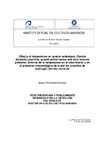Identificador persistente para citar o vincular este elemento:
https://accedacris.ulpgc.es/jspui/handle/10553/74458
| Campo DC | Valor | idioma |
|---|---|---|
| dc.contributor.advisor | Montero Vítores, Daniel | - |
| dc.contributor.advisor | Caballero Cansino, María José | - |
| dc.contributor.author | Fernández Montero, Álvaro | - |
| dc.date.accessioned | 2020-09-17T10:16:56Z | - |
| dc.date.available | 2020-09-17T10:16:56Z | - |
| dc.date.issued | 2016 | en_US |
| dc.identifier.uri | https://accedacris.ulpgc.es/handle/10553/74458 | - |
| dc.description.abstract | El medregal (Seriola dumerili, Riso 1810) es una especie con un alto interés para diversificar la acuicultura europea debido a su elevada tasa de crecimiento y su importante valor comercial a pesar de su escasa producción actual. Sin embargo, existe poca información que relacione la temperatura con importantes parámetros biológicos para esta especie. De esta manera, el objetivo general de este estudio fue determinar el efecto que producen distintas temperaturas de cultivo en el crecimiento y el potencial inmune de la piel de Seriola dumerili. Para alcanzar este objetivo, se cultivaron a tres temperaturas (17, 22 y 26ºC) en sistema de recirculado (RAS) utilizando peces de 19,5 gramos. Se realizó una alimentación a saciedad aparente durante 120 días de experimento tomándose datos de peso y talla cada 30 días. Al finalizar el experimento, se realizó un ensayo de tiempo de vaciado gástrico y de tránsito intestinal. Además, se recogieron muestras para determinar composición bioquímica, estudios morfológicos, parámetros inmunológicos y de bienestar animal. Finalmente se realizó una prueba de parasitación dejando en abierto los sistemas para estudiar el efecto producido en la piel por Neobenedenia girellae. El mejor crecimiento, eficiencia alimenticia, ganancia de nutrientes y tiempo de tránsito intestinal se dio a 26ºC. Los análisis morfométricos señalaron diferencias entre 17ºC y 26ºC. La aclimatación a 26ºC no indujo cambios en los parámetros inmunológicos y de bienestar animal medidos. Sin embargo, a alta temperatura la incidencia de infección por ectoparásitos fue mayor. El estudio mediante microscopía óptica y electrónica de barrido mostro importantes daños producidos por la fijación de N. girellae en la piel. | en_US |
| dc.description.abstract | The greater amberjack (Seriola dumerili, Risso 1810) is a marine pelagic species with a high interest for European aquaculture diversification due to its rapid growth and high commercial value despite there is not so much published data on the optimum temperature for growth of this species. Thus, the general objective of this study was to determine the effect of different temperatures on growth performance and the immune potential of skin of Seriola dumerili. Greater amberjack juveniles of ~19.5 body weight were distributed in 18 tanks. Each three tanks were controlled by one RAS at different experimental temperatures (17, 22 and 26 ºC). Fish were fed to apparent satiety during 120 days and data of growth was collected each month. At the end of the experimental period, a study on the gastric evacuation and gut transit time was conducted. Besides, samples of different tissues were also obtained for biochemical composition, morphometric (body shape) determinations, welfare and health parameter measurements. Additionally, systems were left open to allow parasitic infection and thus to study the effect of ectoparasite Neobenedenia girellae infection in the skin. The best growth performance, feed conversion ratio, gut transit time and nutrient retention were obtained for those fish reared at 26ºC. Morphometric analyses showed differences between fish held at 17ºC and 26ºC. Acclimation to high temperature (26ºC) did not produce alteration on immunological and animal welfare parameters. However, ectoparasite incidence was higher at high temperature. The study through optical and electron microscopy of greater amberjack skin showed important damage caused by the fixation of N. girellae. | en_US |
| dc.language | eng | en_US |
| dc.relation | Exploring The Biological And Sociio-Economic Potential Of New/Emerging Candidate Fish Species For The Expansion Of The European Aquaculture Industry | en_US |
| dc.subject | 251092 Acuicultura marina | en_US |
| dc.subject.other | Seriola dumerili, | en_US |
| dc.title | Effects of temperature on greater amberjack ("Seriola dumerili") juveniles, growth performance and skin immune potential | en_US |
| dc.title.alternative | Efectos de la temperatura en el crecimiento y en el potencial inmunológico de la piel en juveniles de medregal ("Seriola dumerili") | en_US |
| dc.type | info:eu-repo/semantics/masterThesis | en_US |
| dc.type | MasterThesis | en_US |
| dc.contributor.departamento | Departamento de Biología | en_US |
| dc.contributor.facultad | Facultad de Ciencias del Mar | en_US |
| dc.investigacion | Ciencias | en_US |
| dc.type2 | Trabajo final de máster | en_US |
| dc.description.notas | Máster Oficial en Cultivos Marinos ; 2015-2016. Diploma de Master of Science en Acuicultura otorgado por el Centro Internacional de Altos Estudios Agronómicos Mediterráneos (CIHEAM) | en_US |
| dc.utils.revision | Sí | en_US |
| dc.identifier.matricula | TFT-37481 | es |
| dc.identifier.ulpgc | Sí | en_US |
| dc.contributor.buulpgc | BU-BAS | en_US |
| dc.contributor.titulacion | Máster Universitario en Cultivos Marinos | es |
| item.fulltext | Con texto completo | - |
| item.grantfulltext | restricted | - |
| crisitem.project.principalinvestigator | Izquierdo López, María Soledad | - |
| crisitem.advisor.dept | GIR Grupo de Investigación en Acuicultura | - |
| crisitem.advisor.dept | IU de Investigación en Acuicultura Sostenible y Ecosistemas Marinos (IU-Ecoaqua) | - |
| crisitem.advisor.dept | Departamento de Biología | - |
| crisitem.advisor.dept | GIR IUSA-ONEHEALTH 3: Histología y Patología Veterinaria y Forense (Terrestre y Marina) | - |
| crisitem.advisor.dept | IU de Sanidad Animal y Seguridad Alimentaria | - |
| crisitem.advisor.dept | Departamento de Morfología | - |
| crisitem.author.fullName | Fernández Montero, Álvaro | - |
| Colección: | Trabajo final de máster Restringido ULPGC | |
Visitas
326
actualizado el 15-ene-2026
Descargas
66
actualizado el 15-ene-2026
Google ScholarTM
Verifica
Comparte
Exporta metadatos
Los elementos en ULPGC accedaCRIS están protegidos por derechos de autor con todos los derechos reservados, a menos que se indique lo contrario.
